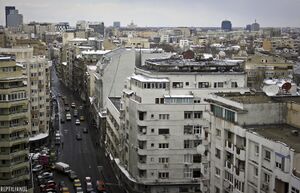Grey Belt: Difference between revisions
m (Ajax article spotlight for March 2021) |
No edit summary |
||
| (One intermediate revision by the same user not shown) | |||
| Line 7: | Line 7: | ||
| caption1 = Kradova Boulevard in Valegoria, showing a mix of New Society and older architectural styles. | | caption1 = Kradova Boulevard in Valegoria, showing a mix of New Society and older architectural styles. | ||
| image2 = Ostrozava-RazovaPlant.jpg | | image2 = Ostrozava-RazovaPlant.jpg | ||
| caption2 = | | caption2 = Vandarek Power Plant, in the S.R. Ardovia, built 1972. | ||
| image3 = Ostrozava-DevaArchitecture.jpg | | image3 = Ostrozava-DevaArchitecture.jpg | ||
| caption3 = City of Deva in northern | | caption3 = City of Deva in northern Valdavia, showing the majority of architecture in New Society style. | ||
}} | }} | ||
'''"Grey Belt"''' is an informal term for the region of central [[Ostrozava]] that has served as the industrial core of the nation since the mid-1960s. It roughly includes the entire center of the Transkarminian region, from eastern Rheigen to the Karmin Delta in Strakosko. The term "Grey Belt" originates in the [[Ostrozava#Reform and Integration|New Society movement]] of the mid-20th century, which saw rapid industrialization and the construction of many new cities in a distinct architectural style, often at the expense of historical landmarks, especially in small villages. While some cities in the Grey Belt, such as Valegoria, have maintained a majority of their medieval architecture, they are still included due to the density of newly-constructed suburbs and importance to the industrial region. | '''"Grey Belt"''' is an informal term for the region of central [[Ostrozava]] that has served as the industrial core of the nation since the mid-1960s. It roughly includes the entire center of the Transkarminian region, from eastern Rheigen to the Karmin Delta in Strakosko. The term "Grey Belt" originates in the [[Ostrozava#Reform and Integration|New Society movement]] of the mid-20th century, which saw rapid industrialization and the construction of many new cities in a distinct architectural style, often at the expense of historical landmarks, especially in small villages. While some cities in the Grey Belt, such as Valegoria, have maintained a majority of their medieval architecture, they are still included due to the density of newly-constructed suburbs and importance to the industrial region. | ||
[[File:OstrozavaMapGreyBelt.png|thumb|left|The Grey Belt, at its largest informal definition.]] | [[File:OstrozavaMapGreyBelt.png|thumb|left|The Grey Belt, at its largest informal definition.]] | ||
The Grey Belt begins in eastern Rheigen, near Nimsven, and extends south into | The Grey Belt begins in eastern Rheigen, near Nimsven, and extends south into Valdavia, including the capital of Balta, and northeast through the [[Ostrozava#Federal subjects|Somvor Quadrilateral]] through the entire Subprime of Litovía, the Greater Karsko Megalopolis, and into Strakosko and the Karmin Delta. The Grey Belt has historically been a stronghold of Socialist Party power, except for northern Litovía and Libebor, where the Progressive Party has held considerable power since the 1960s, leading to accusations of {{wp|gerrymandering|Kradzehranícen}}. Not all cities in the Grey Belt have only New Society architecture; Karsko, Valegoria, Libebor, and Balta have all retained their city centers, though suburbs have largely taken on the style. Similarly, the "Grey Belt" style isn't limited to its namesake region, with concrete-panel buildings being fairly common throughout industrial sectors and new-built cities across Ostrozava, just not in the same density. [[Category:Ajax]] | ||
[[Category:Ostrozava]] | [[Category:Ostrozava]] | ||
Latest revision as of 01:32, 8 November 2022
This article is incomplete because it is pending further input from participants, or it is a work-in-progress by one author. Please comment on this article's talk page to share your input, comments and questions. Note: To contribute to this article, you may need to seek help from the author(s) of this page. |
"Grey Belt" is an informal term for the region of central Ostrozava that has served as the industrial core of the nation since the mid-1960s. It roughly includes the entire center of the Transkarminian region, from eastern Rheigen to the Karmin Delta in Strakosko. The term "Grey Belt" originates in the New Society movement of the mid-20th century, which saw rapid industrialization and the construction of many new cities in a distinct architectural style, often at the expense of historical landmarks, especially in small villages. While some cities in the Grey Belt, such as Valegoria, have maintained a majority of their medieval architecture, they are still included due to the density of newly-constructed suburbs and importance to the industrial region.
The Grey Belt begins in eastern Rheigen, near Nimsven, and extends south into Valdavia, including the capital of Balta, and northeast through the Somvor Quadrilateral through the entire Subprime of Litovía, the Greater Karsko Megalopolis, and into Strakosko and the Karmin Delta. The Grey Belt has historically been a stronghold of Socialist Party power, except for northern Litovía and Libebor, where the Progressive Party has held considerable power since the 1960s, leading to accusations of Kradzehranícen. Not all cities in the Grey Belt have only New Society architecture; Karsko, Valegoria, Libebor, and Balta have all retained their city centers, though suburbs have largely taken on the style. Similarly, the "Grey Belt" style isn't limited to its namesake region, with concrete-panel buildings being fairly common throughout industrial sectors and new-built cities across Ostrozava, just not in the same density.



